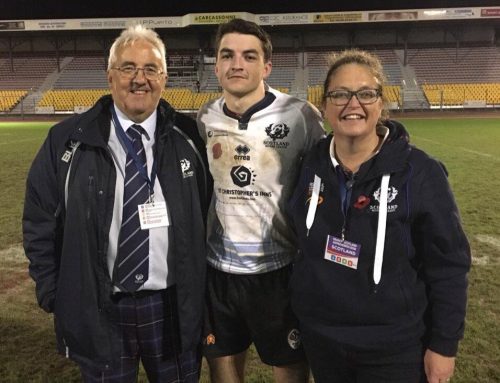Rugby League can be a world of extreme highs, and at times extreme lows.
As part of Mental Health Awareness week we spoke to Scotland international Ryan Brierley about how those low moments have affected his mental health, and the lessons he has learned regarding mental health awareness.
Ryan made his debut for Scotland back in 2016, and has had some great moments during his time in the side.
“Playing against Australia in the Four Nations would have to be up there, getting to represent your country against the best players in the world was something special. A lot of these things you probably reflect on more when you retire, but that stands out as a memory now.
“Being Vice-captain for the 2019 qualifiers was a nice moment too, I’d never really been given a leadership role before, so to be trusted by the coach to have such an important role was special. I’m quite loud when I’m playing, so it didn’t change things too much on the pitch!”
As is often the case in professional sport, and life, those highs have come hand in hand with tough periods. For Brierley, there was no tougher moment than when he missed out on the 2017 Rugby League World Cup in Australia. Ryan was ready to get on the plane with his bags packed, when his club side withdrew him from contention.
“It was the lowest point of my career, being at the airport ready to go to the World Cup. It was a horrendous time for me, being on the brink of playing in Australia, which had always been one of the main goals in my career.
“The worst thing about it was that I was just at home doing nothing with my head spinning, feeling void and worthless about not being able to help my teammates. It was a really tough period in my career and my life. It was a hectic time, I had two injuries that needed surgeries as well.
“I probably didn’t deal with it well, I was selfish about things and treated people how they shouldn’t be treated, because I was so down about it. I’m sure I’ve learned from those mistakes, not to say that I’ll behave the right way in the future, but I’m definitely more prepared to deal with things better now.”
A key lesson for Brierley is the need to separate Rugby from everyday life, and not letting external pressures and issues impact the rest of your life, whilst being open and honest with the people around you.
“It was being aware that Rugby wasn’t everything, it’s not the be all and end all. What happened with me and Australia felt like a massive moment in my life, but really it wasn’t affecting anyone else, so it probably wasn’t as big a deal as it felt like it was.
“I’ve learnt to be more open and honest, and not try to please everybody. It’s also been about understanding how you want to treat the people close to you, everything else can wait because your friends and family are the most important thing, making sure they’re alright and have an understanding about what’s stressing you out.
“I didn’t really want to talk to people about it at the time. Not because I was embarrassed or anything like that, more because I didn’t think anyone would be interested. I thought there were more important things to talk about.
“It creeps up on you without really knowing about it. I only really noticed when after training I would just go home and sleep, not spending time with my family. It was a rut that I didn’t realise I was in, waking up, going to training, going home, going to sleep. I was constantly tired and worrying about things, and it can be a really dangerous place. Going to sleep like that is a flag for me, I know that if i get into that routine then I need to snap out of it.
“Everyone is different, and it’s scary that people can seem fine when they’re not. That scares me, the fact it could be affecting someone that looks on the surface like the happiest person in the world.”
Offering support to people is a good first step for helping people deal with mental health issues, however for Brierley it is vital that people become more educated and aware of mental health issues, with self education taking an important role in combating his own problems.
“The only thing you can do is be there for people, if you think someone’s struggling you have to reach out and check on them. You can offer support, but people also need to research what mental health is themselves. I didn’t know much about it, so I did a bit of digging to try and understand what mental health was, and how it relates to me. It’s worth looking into it yourself, it’s great to offer people support, but there also needs to be an amount of self education and awareness.
“The rugby league environment is a lot better than it used to be, it’s much more supportive. As I’ve got older the changing rooms are a safer space, and you can bring up mental health issues with a good amount of confidentiality.
“Player welfare is improving, because there’s an understanding that players all know how to play rugby, but if they’re not in the right headspace they won’t perform to the best of their abilities.”
On the pitch Ryan has been enjoying his rugby, having struck a good balance of work and family in his life. He is also joined by 5 Scotland teammates at Leigh Centurions, which he hopes will help the national team at this year’s Rugby League World Cup.
“Our performances are getting better, it’s always going to take time. Hopefully the Scottish boys playing together all season will help us at the World Cup! The club is really familiar to me, but it’s been great being able to show guys like James Bell around the place.
“It’s a good advert for Scottish Rugby League to have so many players in Super League, and having guys at the top like Lachlan Coote, it’s the sort of thing we can build off the back of, especially if we have a good World Cup.
We concentrate game by game, but hopefully we can lay some foundations for Scotland Rugby League to grow in years to come.”
If you or someone you know are feeling like support is needed you can contact your GP. You can find a wide range of resources also at NHS Inform or the Scottish Association for Mental Health (SAMH)
If you want to speak to someone, Breathing Space is a free and confidential phone line for anyone experiencing low mood or depression you can contact them on 0800 83 85 87.
Samaritans offer a 24 hour a day confidential phone line, face-to-face and online support to anyone who is feeling distress or despair. You can call them on 116 123.
Papyrus is a free helpline dedicated to people under 35 who are thinking about taking their own life. Or anyone concerned that a young person could be thinking about this, you can contact the HOPELineUK on 0800 068 41 41 everyday from 9am until Midnight
For Rugby League dedicated Mental Health advice and support RLCares and State of Mind provide provision for sports men and women.


















